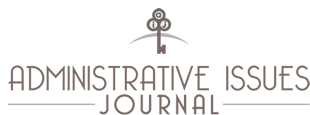
VOLUME 3, ISSUE 1: APRIL 2013
Introduction
As an Academic Librarian, it is my pleasure to work with students and faculty from across a range of disciplines. When I was asked to join the AIJ Editorial Board in the spring of 2012, I knew it was an opportunity to engage in the type of cross-disciplinary work that is a staple of university librarianship. The chance to work with professors from so many disciplines has proven to be demanding, engaging, and quite a bit of fun.
Inquiry as its own reward is an indulgence that, as academics, we rarely get to pursue. Yet reviewing manuscripts for publication in AIJ is just that sort of work. In the fields of Administration, Nursing, Business, and others, we are exploring questions and studies that seek to address the multitude of issues surrounding these disciplines. It is practical work. The research and writing we are privileged to publish reflects the inquiry and discipline of its authors. As publishers, we want to bring this type of writing to as large an audience as possible.
AIJ is an Open Access journal. It has been since its inception in 2011, and one of my early goals was to have this aspect of our journal fully recognized—to stress the importance of this to our university administrators, our faculty, the other editors and our readers. We are an Open Access journal in design, function, and intent. Our funding model does not charge readers or our institution for access; instead, we provide the journal’s content without charge on the principle that making research freely available to the public supports a greater global exchange of knowledge.
I am pleased to report that, as of April 2013, the Administrative Issues Journal is now indexed in the Directory of Open Access Journals (DOAJ). The DOAJ features more than 8,300 titles and more than 920,000 articles. The global coverage of the directory has expanded greatly, and this expansion reflects the degree to which Open Access is being promoted and demonstrates the vitality of e-scholarship. The current publishing model for academic scholarship is unsustainable. The economics do not make sense in a digital environment. As an Open Access, peer-reviewed journal, AIJ contributes to scholarship and information-sharing in a way that furthers the dialogue of 21st century publishing practices and the goals of scholarship in the digital age.
Our inclusion in DOAJ means the articles in this issue will be uploaded with metadata. The journal articles (in PDF format) will be included in long-term preservation projects. DOAJ statistics show more than 10 million successful requests a month for DOAJ content from all over the world and that web crawlers are fetching the content of DOAJ to be a part of their search engines.
In the end, what Open Access represents to authors means that what you write, the world will read. As a Librarian concerned with access, preservation, and usage, it is a privilege to work alongside my fellow editors and to be a part of a process that is changing the world in which we live.
Frederic W. Murray
Editor-at-Large
Articles
LETTER FROM THE EDITOR
Frederic W. Murray
THE VIRTUAL PROFESSOR: A NEW MODEL IN HIGHER EDUCATION
Randall Valentine and Robert Bennett
REFERENCE LETTERS AND THE UNINFORMED BUSINESS EDUCATOR: A U.S. LEGAL PERSPECTIVE
Nina Compton and Pia A. Albinsson
USING AN EQUITY/PERFORMANCE MATRIX TO ADDRESS SALARY COMPRESSION/INVERSION AND PERFORMANCE PAY ISSUES
Peter Richardson and Steven Thomas
DEVELOPING A NEW GRADUATE PROGRAM IN HEALTHCARE MANAGEMENT: EMBRACING THE TRANSFORMATION OF HEALTHCARE MANAGEMENT EDUCATION ON A PATHWAY TO SUCCESS
Daniel G. Dominguez, Chris Garcia, and Kevin G. LaFrance
SMALL RURAL SCHOOL DISTRICT CONSOLIDATION IN TEXAS: AN ANALYSIS OF ITS IMPACT ON COST AND STUDENT ACHIEVEMENT
Dwight A. Cooley and Koy A. Floyd
THE IMPACT OF SYMBOLIC SPEECH IN PUBLIC SCHOOLS: A SELECTIVE CASE ANALYSIS FROM TINKER TO ZAMECNIK
Charles R. Waggoner
EFFECTS OF READING STRATEGIES AND THE WRITING PROCESS WITH WRITTEN RECASTS ON SECOND LANGUAGE ACHIEVEMENT
Helen Ramirez and Don Jones
TOLERANCE AS CIVILITY IN CONTEMPORARY WORKPLACE DIVERSITY INITIATIVES
C. W. Von Bergen and George Collier
